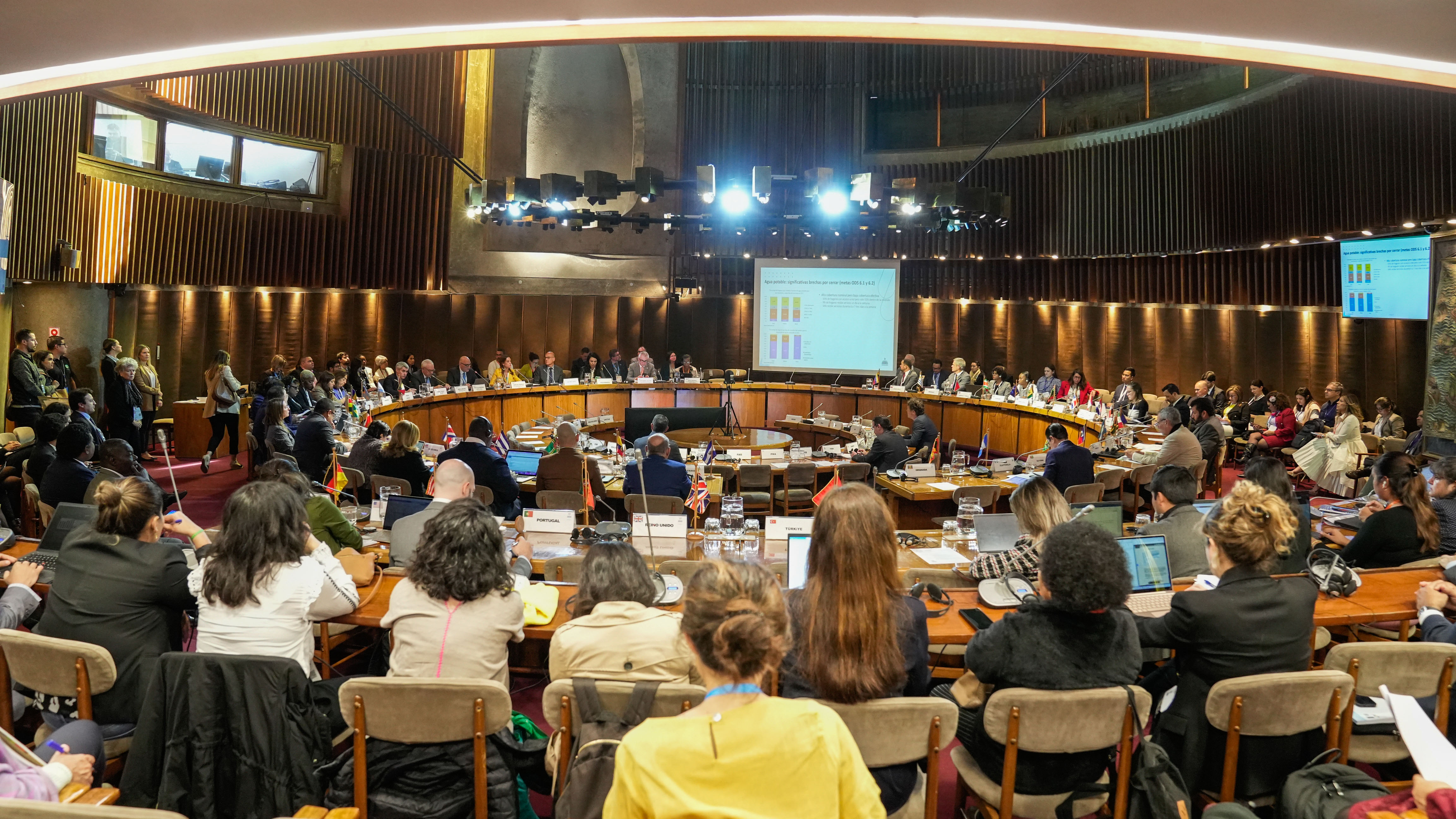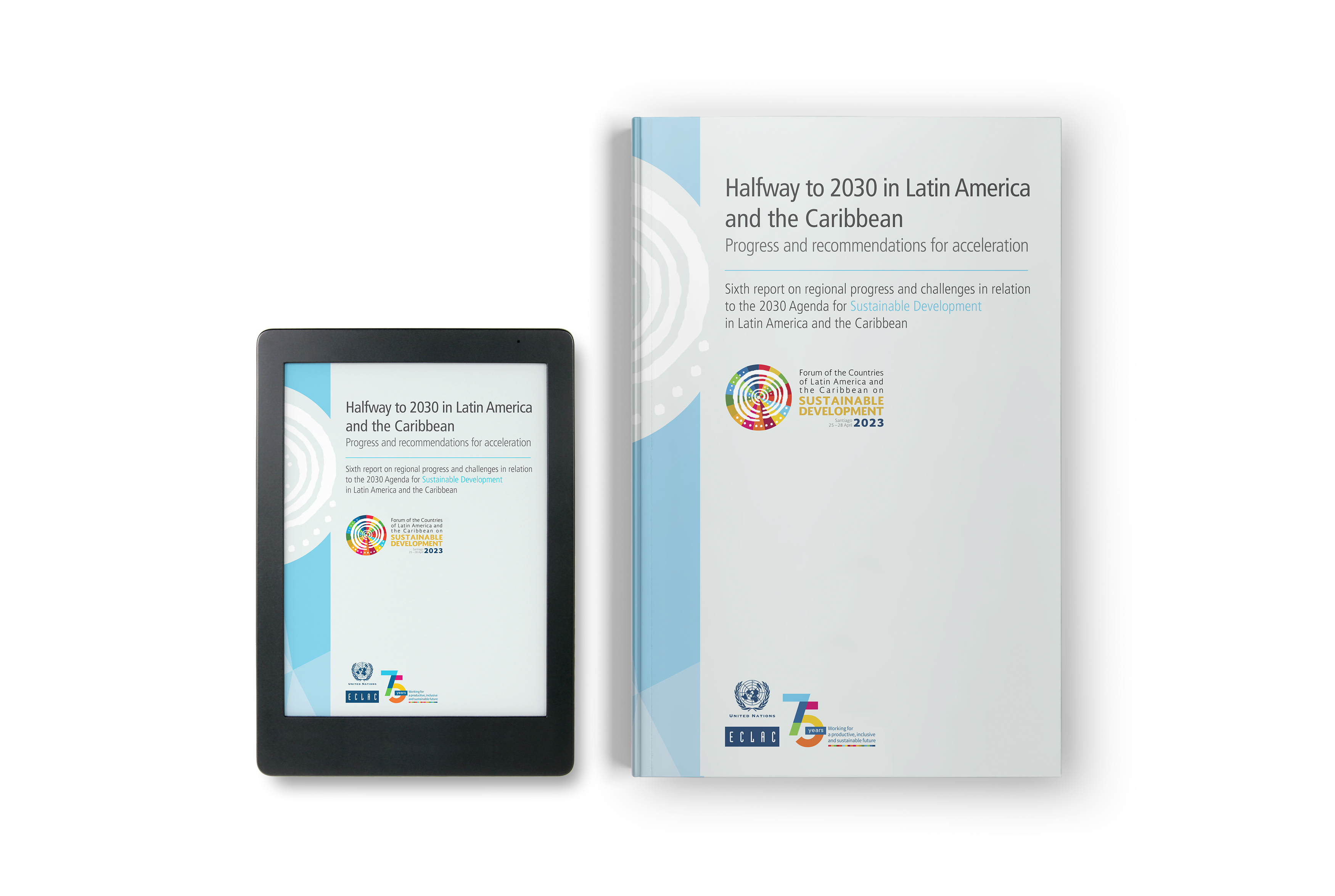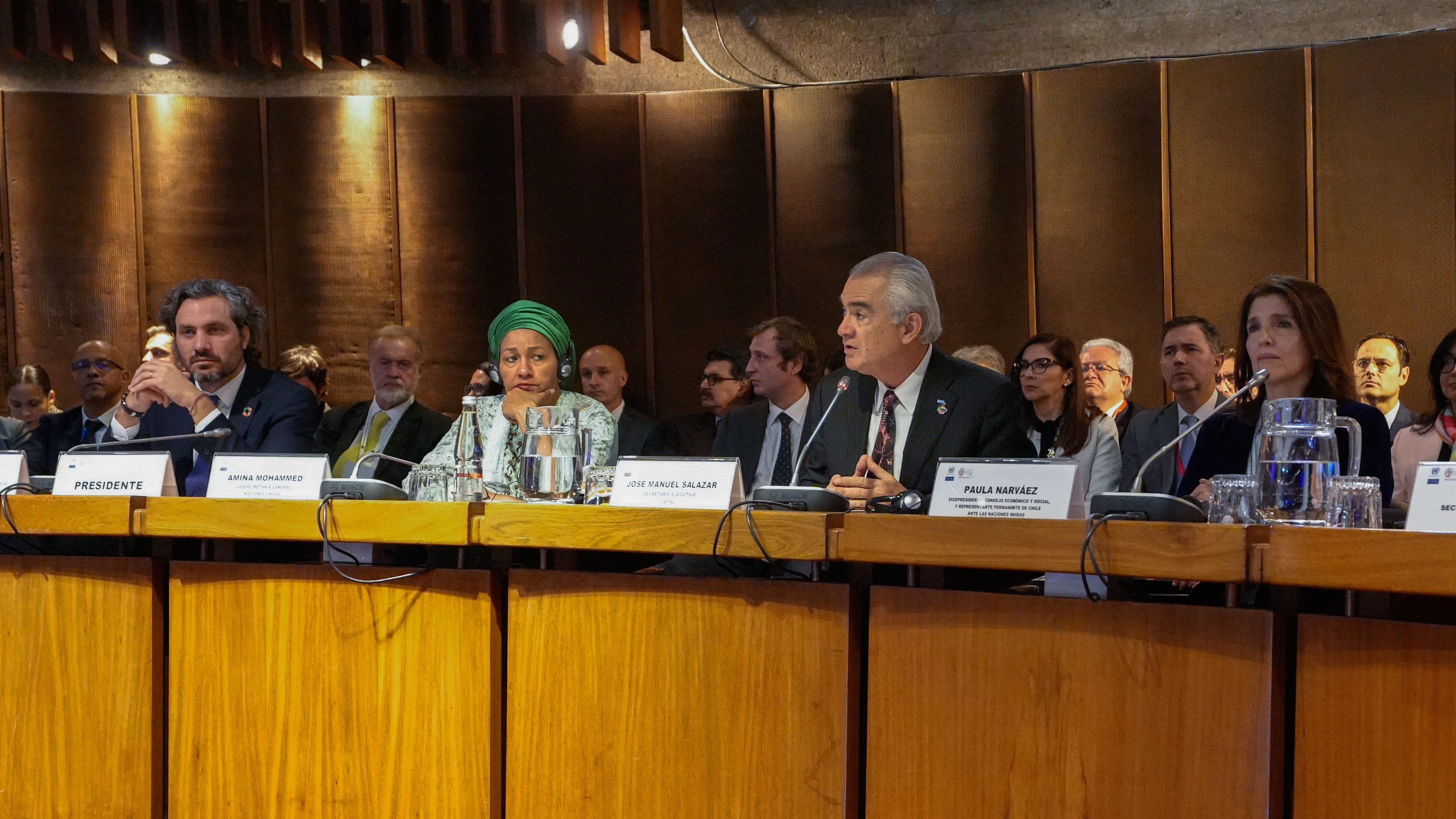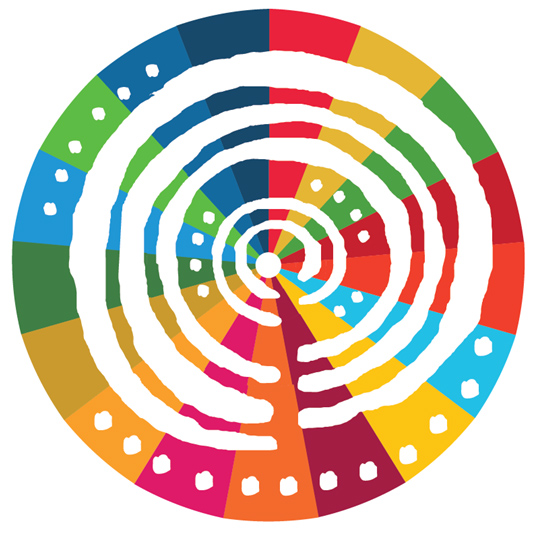The Region’s Countries Evaluated the Implementation of Four SDGs on the Second Day of the Forum on Sustainable Development
It is necessary to redouble efforts to achieve Sustainable Development Goals (SDGs) 6, 7, 9 and 11, representatives asserted at the meeting being held at ECLAC’s headquarters in Santiago, Chile.

Representatives of government, international organizations, the private sector, civil society and academia shared experiences, good practices and challenges today in relation to fulfilling the 2030 Agenda’s SDG 6 (Clean water and sanitation), SDG 7 (Affordable and clean energy), SDG 9 (Industry, innovation and infrastructure) and SDG 11 (Sustainable cities and communities), on the second day of the Sixth Meeting of the Forum of the Countries of Latin America and the Caribbean on Sustainable Development.
The Forum, which has drawn more than 1,000 participants, was officially inaugurated on Wednesday and will conclude this Friday at the central headquarters of the Economic Commission for Latin America and the Caribbean (ECLAC) in Santiago, Chile.
Halfway through the period established for achieving the Sustainable Development Goals (SDGs), Latin American and Caribbean countries show great commitment to the 2030 Agenda as a road map for building a better future that would leave no one behind. However, as of now, only one-fourth of the targets have been fulfilled or are forecast to be fulfilled, according to the document Halfway to 2030 in Latin America and the Caribbean: progress and recommendations for acceleration, which was presented by ECLAC.
On the panels held this Thursday, speakers emphasized the integrality of the 2030 Agenda for Sustainable Development and its 17 SDGs, along with the need to redouble efforts in order to achieve the established targets. These representatives recognized numerous social and territorial gaps and challenges in relation to institutions, financing, public-private coordination, social participation, the mainstreaming of gender, intersectional and human rights perspectives, as well as statistical production and regional cooperation.
The participants in Panel 1. Goal 6: Clean water and sanitation stressed the importance of water both as a human right and as a natural and economic resource. There has been progress, they stated, but challenges remain for ensuring universal access to drinking water and sanitation, and for improving wastewater management and treatment and the integrated management of water resources.
They also discussed the need to implement policies that would address the growing impacts of drought, water stress, pollution and climate change. Comprehensive, inter-agency and inter-state interventions are needed, with the participation of all stakeholders, to strengthen the institutional framework for water and move towards a sustainable and inclusive water transition, they emphasized.
The panel was made up of Freddy Mamani, Deputy Minister of Foreign Affairs of the Plurinational State of Bolivia (via video); Pável Isa Contreras, Minister of Economic Affairs, Planning and Development of the Dominican Republic; Mario Lubetkin, Regional Representative for Latin America and the Caribbean of the Food and Agriculture Organization of the United Nations (FAO); Daniel Tugues, Deputy General Manager of Aguas Andinas; and Ruth Spencer of the Yale International Alliance of Antigua and Barbuda. The panel was moderated by Carolina González, Undersecretary of International Affairs and Federal Cooperation at Argentina’s Ministry of Social Development.
On Panel 2. Goal 7: Affordable and clean energy, participants analyzed progress and challenges in relation to the “energy trilemma,” which refers to countries’ capacity to provide safe, clean and affordable energy.
Latin America and the Caribbean has made significant progress on access to electricity and it stands out in the world for its use of renewable sources for power generation, the representatives indicated. However, gaps remain in access to energy for cooking and heating, and the region lags in the area of energy efficiency.
The panelists urged for promoting regulations and local developments in electromobility and contended that, without a substantive change in the production and consumption model, emission reduction proposals maintain the status quo while the impact of climate change continues to batter developing countries.
Speaking on the panel were Walter Verri, Vice Minister for Industry, Energy and Mining of Uruguay; Andrés Rebolledo, Executive Secretary of the Latin American Energy Organization (OLADE); Germán Carmona, Academic at the Institute of Engineering of the National Autonomous University of Mexico (UNAM); and Kaira Reece, Sustainable Development Secretary at the Trade Union Confederation of the Americas (CSA).
Meanwhile, the speakers on Panel 3. Goal 9: Industry, innovation and infrastructure emphasized the close relationship between productive, industrial, and scientific and technological development and people’s quality of life. Although there have been improvements in infrastructure, in recent decades Latin America and the Caribbean has experienced a significant process of deindustrialization, and investment in research and development is still insufficient and is concentrated in just a few countries, they said.
In this context, representatives from distinct countries in the region, such as Chile and Colombia, shared their current strategies for reindustrialization, digitalization and innovation with a view to moving towards knowledge-based economies, productive diversification, decarbonization and a green and just transition.
Furthermore, they stressed the need to mainstream the gender perspective in industry, foster women’s participation in the fields of Science, Technology, Engineering and Mathematics (STEM), and invest in comprehensive care systems, as a new industry, due to their multiplier effects on the economy and society. In addition, they flagged the importance of territorial development and recognition of the contributions and traditional systems of indigenous peoples.
The panelists in this case were Nicolás Grau, Minister of Economic Affairs, Development and Tourism of Chile; Clelia Hernández, Director-General of the Nuevo León 4.0 Initiative of Mexico; Perpétua Almeida, Director of the Brazilian Agency for Industrial Development (ABDI); Manuel Albaladejo, Regional Representative for Argentina, Chile, Paraguay and Uruguay of the United Nations Industrial Development Organization (UNIDO); Brígida Fernández Rubio, Director General of the Development Planning Committee of the State of Baja California, Mexico; Hernán Ceballos, Manager of iNNpulsa Colombia; Fernando Saiz, Director of Public Affairs and Regulation of Telefónica Chile; María-Noel Vaeza, Regional Director for the Americas and the Caribbean of the United Nations Entity for Gender Equality and the Empowerment of Women (UN Women); and Dulce Patricia Torres Sandoval, Member of the General Coordination Committee of the Coordinadora Nacional de Mujeres Indígenas (CONAMI) and Focal Point of the Continental Network of Indigenous Women of the Americas (ECMIA), Mexico. Acting as moderator was Michelle Muschett, Regional Director for Latin America and the Caribbean of the United Nations Development Programme (UNDP).
Finally, on Panel 4. Goal 11: Sustainable cities and communities, the speakers recalled that Latin America and the Caribbean is the world’s most urbanized region: 8 out of every 10 people live in cities and, according to ECLAC’s data, 1 in every 5 families lives in informal settlements.
For that reason, the panelists stressed the need to improve land-use planning, increase investment, eliminate segregation and strengthen the institutional framework to build accessible, friendly, humanized, just, smart, sustainable and safe cities so that all people – including older persons and persons with disabilities – can exercise their right to the city along with the full array of their human rights.
Participating in this panel were Wendy Molina Varela, Vice Minister of Planning at the Ministry of Housing and Human Settlements of Costa Rica; Elkin Velásquez, Regional Director for Latin America and the Caribbean of the United Nations Human Settlements Programme (UN-Habitat); María Soledad Cisternas Reyes, Special Envoy of the Secretary-General on Disability and Accessibility; Armando Enrique Navarrete, Chief Economist of the Central American Bank for Economic Integration (CABEI); Augusto Du Bois Goitia, Second Vice-Chair of the Inter-American Housing Union (UNIAPRAVI); Augusto Barrera Guarderas, Director of the Center for Knowledge Transfer and Social Innovation (CETCIS) of the Pontifical Catholic University of Ecuador; and Arturo Noel Noyola Muñoz of the Red Nacional de Juventudes Afromexicanas (JUAFRO) of Mexico. The moderator was Santiago Maggioti, Minister of Territorial Development and Habitat of Argentina and President of the Forum of Ministers and Highest Authorities of Housing and Urbanism of Latin America and the Caribbean (MINURVI).
Related content

ECLAC Urges Countries to Revitalize Commitments and Accelerate the Pace Towards Fulfilling the Sustainable Development Goals
José Manuel Salazar-Xirinachs, the organization’s Executive Secretary, presented a document that proposes seven transformative initiatives that have the synergistic capacity to simultaneously drive…

Countries Agree on the Urgency of Promoting Bold, Transformative Actions to Speed and Correct the Course Towards Achieving the SDGs
The Sixth Meeting of the Forum of the Countries of Latin America and the Caribbean on Sustainable Development was inaugurated today at ECLAC’s central headquarters in Santiago, Chile.
Related event
Type
Country(ies)
- Latin America and the Caribbean
Contact
Public Information Unit
- prensa@cepal.org
- (56 2) 2210 2040
